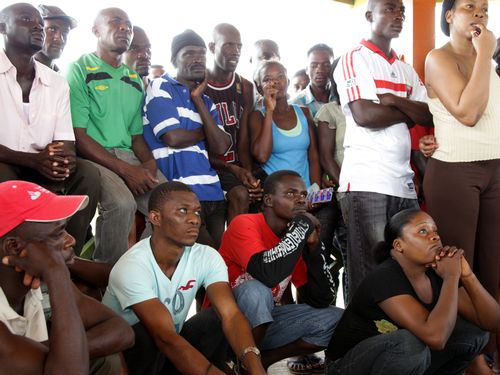
“Brazil fears massive entry of immigrants” wrote Brazil’s O Globo, a daily from Rio de Janeiro, in today’s edition. In another article, the newspaper announced that Brazil would “seal its borders to contain the ‘Haitian invasion‘”. Illegal immigration is nothing new in Brazil. Whoever walks through downtown São Paulo will notice Bolivian or Asian street vendors, many of whom do not possess a valid visa. The government offers a general amnesty to all illegal immigrants every once in a while – the last one occurred under the Lula administration. Yet while NGOs have long called on the government to provide better assistance to illegal immigrants (a number of whom are underage, do not speak Portuguese, work in slave-like conditions and are scared to contact the police for fear of being deported), the issue never seemed urgent enough to enter the public debate.
It took the recent arrival of roughly 4,000 economic migrants from Haiti in Brazil’s Amazon region (bordering Bolivia, Peru, Colombia and Venezuela) to cause a stir in Brazil’s media. While local government representatives in Acre, a state bordering Bolivia, early on assured that they’d do whatever possible to help the Haitians (many of whom spend thousandso of dollars to arrive in Brazil), the federal government announced today that while the Haitians already on Brazilian soil would receive a visa, Brazil would not accept any additional undocumented migrants.
Many analysts both in Brazil and abroad criticized the move as overly harsh, arguing that Brazil was adopting a posture similar to those of the EU and the United States – which Brazil has traditionally lambasted for their restrictive immigration policy. Spain’s El País today reminded Brazilians of their ‘historic debt’ to immigrants. Others defended the move, pointing to massive domestic problems Brazil had to solve before being able to receive high numbers of economic migrants.
Those in Brazil who believe this episode to be an exception are profoundly mistaken. While the majority of recent migrants come from Haiti, the hemisphere’s poorest country, people from all over the world will seek to benefit from Brazil’s economic rise. As Al Jazeera‘s correspondent Gabriel Elizondo points out in a recent article, he encountered illegal immigrants from as far as Bangladesh during a short walk through a Brazilian bordertown. As the New York Times reported yesterday, immigrants are also arriving in Brazil from Pakistan and India. This clearly shows that stabilizing Haiti will do little to reduce the numbers of economic migrants coming to Brazil – quite to the contrary: as Brazil grows richer, more people will come, no matter what the situation in Haiti is like.
The second fallacy is to believe immigrants will return to their home country once their temporary work permits expire (Brazil’s government announced it would give 5-year work visa’s to all Haitians on Brazilian soil). It took Germany decades to realize that many of its ‘guest workers’ from Southern Europe and Turkey would simply stay on. Looking back, it is hard to believe how the German government could have been so foolish to overlook obvious questions: Would guest workers’ children born in Germany obtain German citizenship? Given that they did not speak German at home, would public schools offer extra courses to help immigrants’ children catch up? Would guest workers’ extended families be allowed to settle in Germany as well? As I have argued in a post last year, Brazil’s society would be well-advised to debate these questions now in order to avoid the glaring mistakes several European countries committed over the past decades.
The third delusion is that boarder controls will have a lasting impact on the number of illegal immigrants. If despair is great enough at home, immigrants are known to assume great risks and assume great costs to make it to the land of opportunity. Tougher policing will merely drive up the price traffickers charge, and it will increase the number of immigrants who die on their way to Brazil as they seek to avoid controls. As The Economist noted in 2001, a first step would be
to admit that there are compelling moral and economic arguments why more people from poor countries should be allowed to move to rich ones. The world has made the movement of goods, money and ideas freer, but not, strangely, the movement of people. It is both right to give desperate people sanctuary and rewarding to welcome new citizens. History has shown that immigrants bring ideas, vigour and ambition, as well as their mere labour (…) Immigrants create jobs as well as filling them; they add to overall economic activity.
At the same time, it is understandable that Brazil’s government has decided to take a restrictive stance for now, seeking to temporarily control the influx of migrants. This is likely to provide respite, however ephemeral, to think hard about the challenges immigration is set to pose for Brazilian society.
To end on a positive note, the fact that so many individuals from around the world take immense risks to come to here should make Brazilians feel proud. Here are some of the things the Haitians said:
“Then we finally got to Brazil, which I’m told is building everything, stadiums, dams, roads,” (New York Times)
“We came to Brazil, which helps us and which treats us as if we were Brazilians. The Brazilians have done a lot for our country.” (O Globo)
“All I want is work, and Brazil, thank God, has jobs for us.” (New York Times)
“I want to go straight to São Paulo, the New York of South America.” (New York Times)
“Brazil’s a rising kind of place, and it needs people like me.” (New York Times)
———
Read also:
How immigration will change Brazil
Book review: “Theories of International Politics and Zombies” by Daniel W. Drezner
On the US-American hegemony over ideas that change the world
Photo credit: Michel Filho/O Globo








